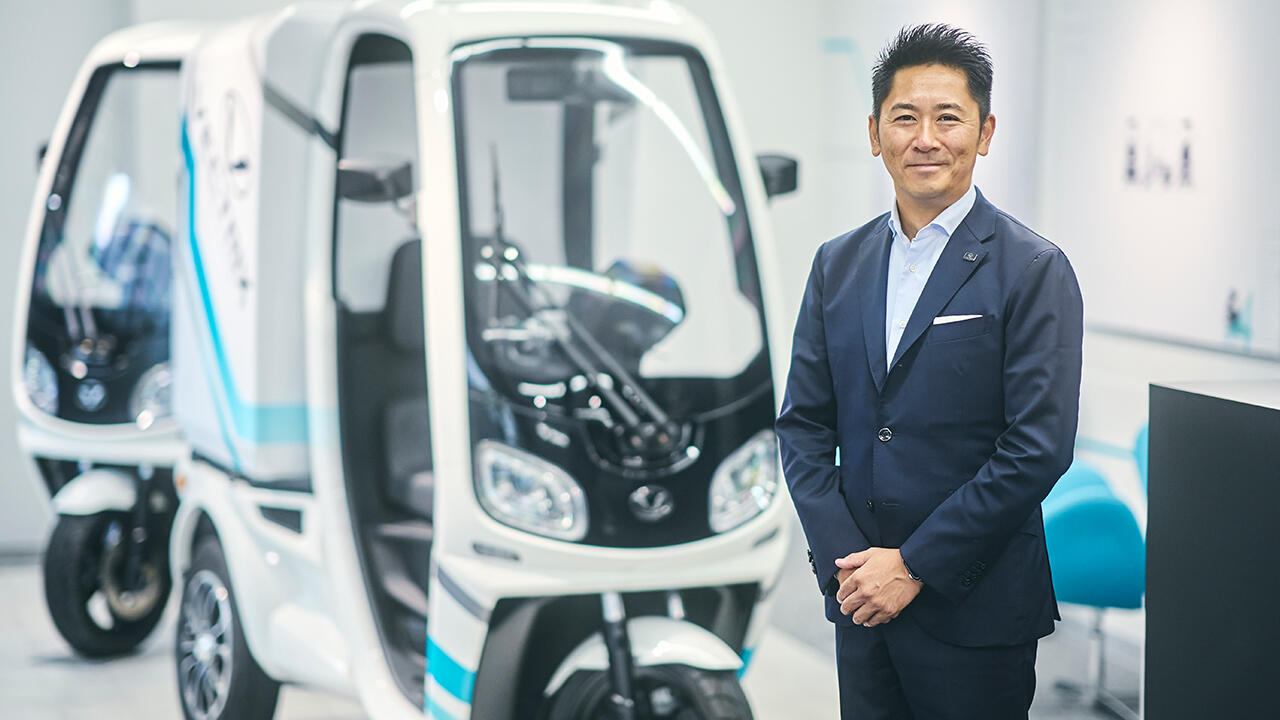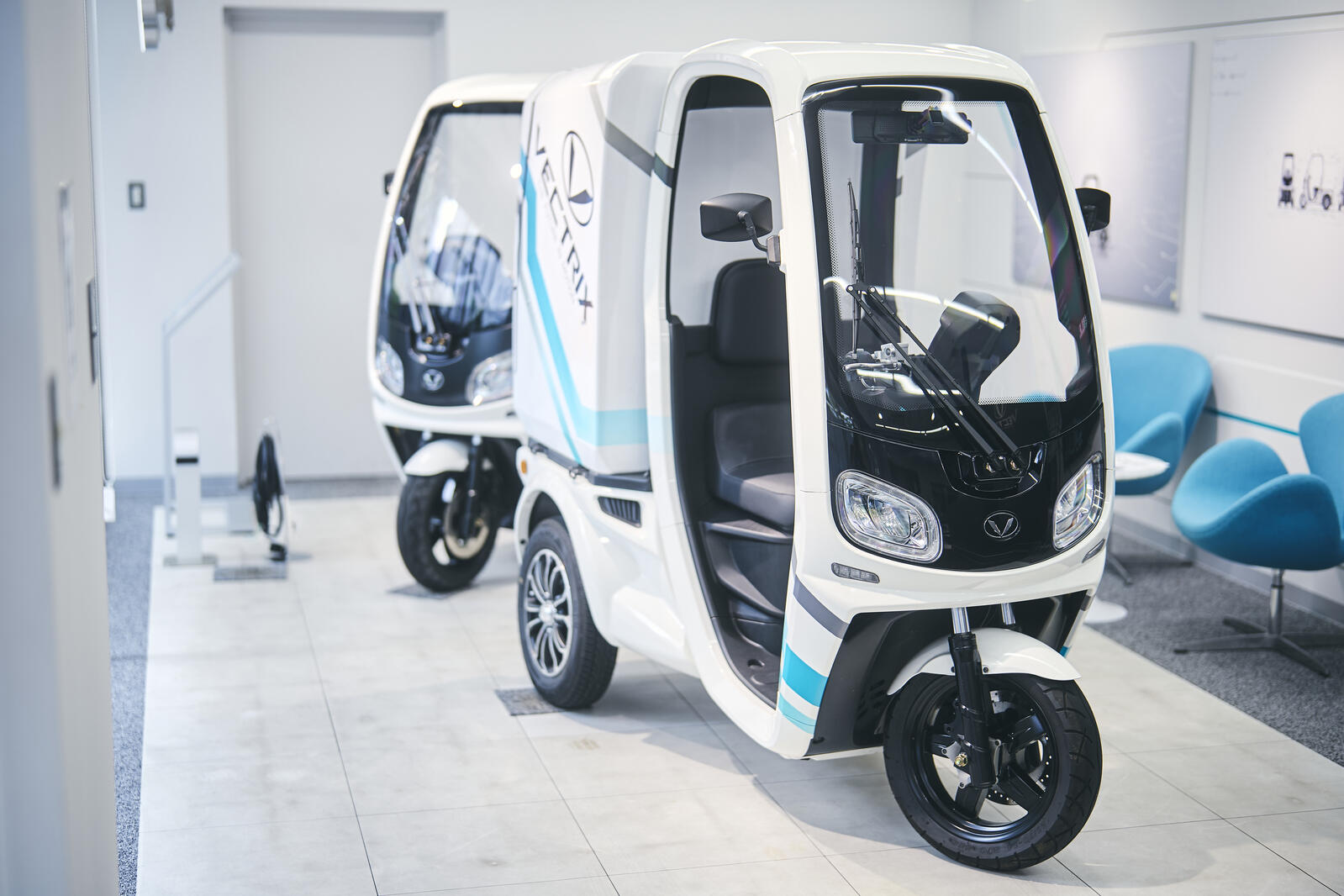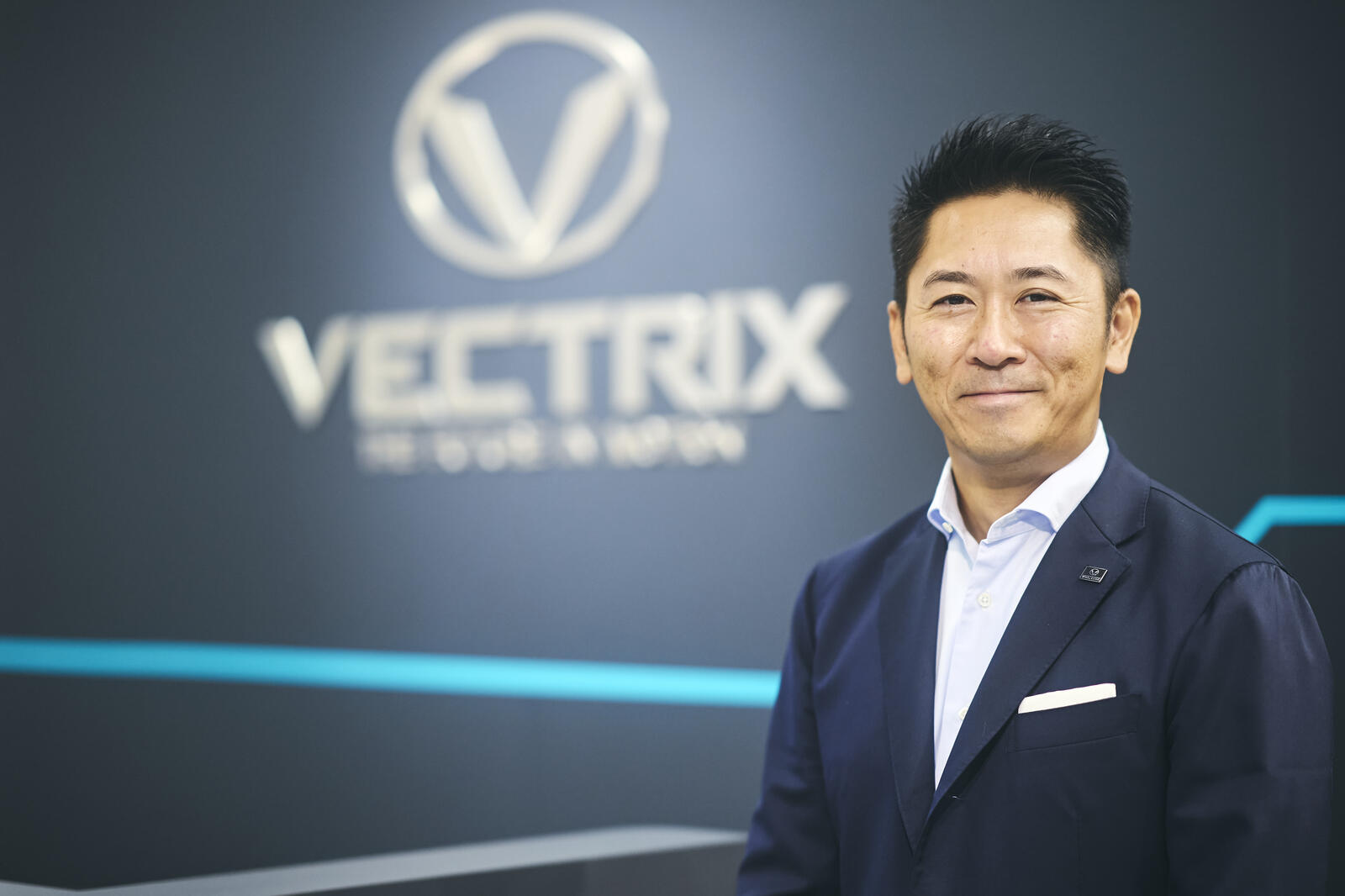
The Partners in Future Mobility series profiles innovative startups that participated in the Japan Mobility Show 2023. For the fifth article, we showcase Vectrix Japan, which is developing a new form of mobility that is neither motorbike nor car.

Held for the first time last fall, the Japan Mobility Show renamed and redefined the Tokyo Motor Show as a platform where various mobility-related companies from the auto industry—and beyond—come together to create the country’s future.
This series profiles innovative startups that participated in the Japan Mobility Show 2023. What does mobility mean to those like-minded partners also working to create the future, and what visions lie behind their endeavors? We delve into the stories that emerge from the Japan Mobility Show and the possibilities they offer for the future of mobility.
Supporting future lifestyles with instantly accessible mobility solutions
Vectrix Japan, which sells I-Cargo, a small commercial three-wheeler electric vehicle (EV), is a global-spanning company with headquarters in Singapore, manufacturing in Taiwan, and design facilities in Italy.
Though originally formed in the U.S. in 1996, Vectrix was reborn in 2018 after being transferred to its current owner. Instead of carrying on with existing models, the new management built a vehicle from scratch—the I-Cargo.

The I-Cargo’s main strengths lie in its ability to carry heavier loads than a typical three-wheeled scooter, up to 100 kg, and a design that keeps the body from tilting during driving and turning, making it easy for anyone to operate. Neither car nor motorbike, it sits in a new mobility category that combines the best attributes of light vans and three-wheeled scooters.
“To help tackle Japan’s 2024 logistics problem, we designed the I-Cargo so that anyone with a regular license could simply hop in and get to work,” says Fumiaki Yamagishi, Vectrix’s Representative Director. “Initially, we focused on last-mile delivery and logistics, but we also envision it being used for constructing, maintaining, and inspecting the infrastructure that sustains daily life, including telecommunications, electricity, water, and gas.”
Drawing on his extensive auto industry experience, including as a car dealer, Yamagishi says his top priorities are delivering comprehensive after-sales support and a stable parts supply network.

“Comprehensive after-sales support is vital for instilling confidence in Japanese users. Without that, the business couldn’t achieve stable, long-term development. With our auto industry experience, we aim to be a newly emerging EV manufacturer that can match those high standards.”
Japanese consumers have a global reputation for exacting quality standards. To put it another way, if a product gains recognition in Japan, it has a good chance of finding a broader market across Southeast Asia and the rest of the world.
“We entrust manufacturing and quality control to Taiwan’s Yulon Motor, which has advanced technical capabilities and is involved in the production of Japanese cars. The location is also significant. Geographically, Taiwan is so close to Okinawa that it even appears in our weather forecasts, which makes it a familiar place we can easily picture. If deliveries are delayed because a typhoon disrupts shipping, for example, we can immediately grasp the situation and communicate it effectively to our customers. Alongside quality, we want to offer our customers peace of mind.”
Business matching gives rise to new visions for future mobility
At the Japan Mobility Show 2023, Vectrix exhibited its offerings as part of the Startup Future Factory.
“Whereas traditional motor shows were aimed at the general public, the Japan Mobility Show’s Startup Future Factory is geared toward matching companies. Along with the name change, I think the shift from BtoC to the world of BtoB was great, creating an ecosystem for bi-lateral relationships rather than one-way transactions.”
For up-and-coming manufacturers, the chance to create new businesses by teaming up with various companies is a very attractive prospect.
“Both in terms of funding and personnel, it’s hard for a startup to put together a dedicated team to map out the future of mobility. That’s why we are so grateful for this kind of business matching platform, where we can gain new ideas and ways of using mobility and a future that we couldn’t envision on our own.”
Benefits beyond decarbonization
A new type of commercial EV that combines the advantages of both cars and motorcycles is the I-Cargo. Though it is currently sold only to business customers, Vectrix hopes this innovative category will also help solve various social issues.
“We believe that widespread adoption of EVs is critical for achieving carbon neutrality. To make that happen, we must come up with ways of improving convenience. That includes better after-sales support and things like swappable batteries that can be charged via household sockets (100V). We also want to offer a multitude of benefits beyond decarbonization, such as creating new delivery driver jobs that make use of the fact that our I-Cargo requires only a regular license.”
In the coming years, Vectrix plans to unveil 3 new three-wheeled EV motorbikes, 2 EV scooter models, and a maxi scooter.
“We plan to keep expanding our range in line with customer needs. Ultimately, we hope to conquer the compact EV market and become a leader in small mobility solutions that are part of everyday life. Working closely with partners to tackle regional challenges, we want to support the lifestyles of our customers through EVs.”
We finished by asking Yamagishi the standard closing question for this series: what is mobility?
“In the sense of vehicles with tires powered by some form of energy, it is a world that hasn’t undergone significant evolution. Rather, I think the world of mobility is driven by evolving uses and applications. I believe that mobility is about enhancing and expanding convenience in a mature society.”

Finally, the Japan Mobility Show is here again, with Japan Mobility Show Bizweek 2024 kicking off next week, October 15 to 18, at Makuhari Messe (Chiba).
At last year’s show, then-JAMA Chairman Akio Toyoda spoke about launching the startup support initiative during a “big recap” session on the event’s final day. “I felt the potential for new narratives that are greater than the sum of their parts,” he said. “When that virtuous cycle is turning, you can also sense a future for Japan.”
This year, the Japan Mobility Show will feature booths by a planned 208 exhibitors, consisting of 150 startups and 58 established companies. Companies will present their business challenges and potential solutions, spurring engagement with other participants. What new narratives will emerge to shape our future mobility society?

